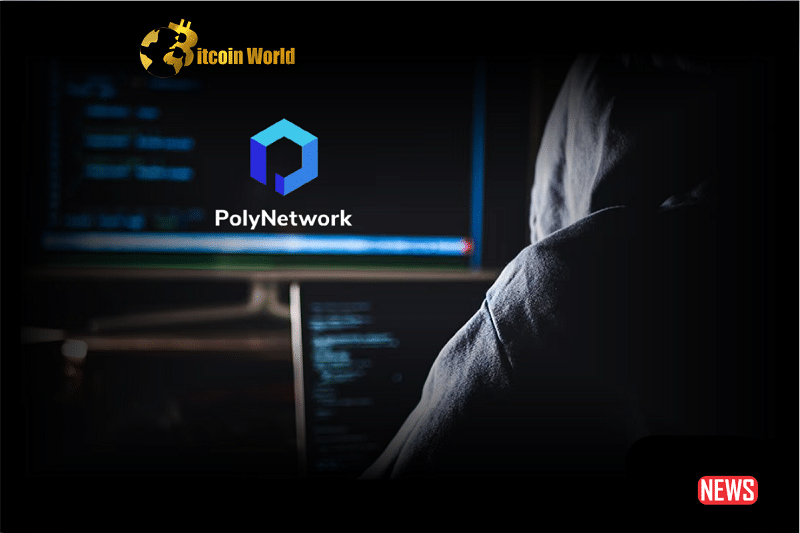Hold on to your hats, crypto enthusiasts! Just when you thought the wild west of DeFi was calming down, another massive hack hits the headlines. This time, it’s Poly Network, a platform designed to let different blockchains talk to each other. Get ready for a rollercoaster of numbers, security concerns, and a surprising twist involving… a lack of liquidity?
Déjà Vu? Poly Network’s Second Major Breach
If the name Poly Network rings a bell, it’s probably because they were on the receiving end of a hefty $600 million theft back in 2021. Fast forward to Sunday, July 2nd, and history seems to be repeating itself. The platform experienced another significant breach, forcing them to temporarily shut down services. The initial reports? A staggering $44 billion worth of digital assets potentially compromised.
The Hacker’s Bold Move: Minting Billions Out of Thin Air
So, how did this digital heist unfold? Think of it like finding a glitch in the Matrix that lets you print unlimited money. The attacker exploited a vulnerability in Poly Network’s smart contract. This allowed them to essentially mint a colossal amount of tokens. Here’s a breakdown of their audacious actions:
- BNB & BUSD Bonanza: Around 100 million BNB and a whopping 10 billion BUSD were minted on the Metis blockchain.
- SHIB Shenanigans: A mind-boggling 999 trillion SHIB tokens appeared on the Heco network.
- Scattered Spoils: Smaller amounts of various tokens were also minted across other networks like Polygon, Avalanche, BNB Chain, and OKX Chain.
At this point, you might be picturing a villain twirling their mustache, swimming in a vault of crypto. But here’s where the story takes an unexpected turn.
The Liquidity Lockdown: A Silver Lining?
Despite the astronomical figures involved, this hack might not be the crypto mega-heist it initially appears to be. Why? Because the attacker ran into a significant roadblock: liquidity. Imagine having a mountain of gold bars, but nowhere to exchange them for cash. That’s essentially what happened here.
The networks where the attacker minted these tokens simply didn’t have enough trading volume (liquidity) to absorb such massive amounts. Trying to sell off billions of dollars worth of newly minted tokens would have crashed the price to practically zero.
In fact, reports suggest the attacker only managed to convert a relatively small amount – around $5 million – before the crypto community sprang into action.
How Was the Damage Limited? The Power of Collaboration
Once the alarm bells rang, the crypto world demonstrated its ability to rally together. The Poly Network team swiftly contacted on-chain analytics firms and major crypto projects. This rapid response led to the implementation of measures to block the attacker from accessing liquidity. Think of it as shutting off the escape routes.
- Liquidity Pools Frozen: Decentralized exchanges (DEXs) and other platforms that allow users to trade these tokens saw their liquidity pools effectively shut down.
- Binance’s Stance: Changpeng Zhao (CZ), the CEO of Binance, clarified that the incident wouldn’t impact BNB and BUSD on their platform, as they don’t accept deposits from the Metis network. This highlights how centralized exchanges can play a role in mitigating the impact of such attacks.
The Metis blockchain team also reassured their community that the limited liquidity on their network prevented a large-scale sell-off. Essentially, the attacker minted a fortune, but it was largely unusable.
What Does This Mean for the Future of Bridges?
This latest Poly Network incident shines a spotlight on the inherent risks associated with blockchain bridges. These bridges are crucial for the interoperability of different blockchains, allowing users to move assets between them. However, they’ve also become prime targets for hackers. Consider this:
- Convenience vs. Vulnerability: Bridges offer seamless transitions but create central points of failure.
- A Costly History: Since 2017, a staggering $2.5 billion has been lost due to attacks on crypto bridges.
- Lessons Learned (Again?): Poly Network’s unfortunate experience underscores the urgent need for enhanced security measures and robust auditing of bridge protocols.
Key Takeaways: What Can We Learn From This Hack?
The Poly Network saga offers valuable insights for everyone involved in the crypto space:
- Liquidity is a Powerful Defense: While often discussed in the context of trading, this incident demonstrates how a lack of liquidity can actually hinder attackers.
- Community Collaboration is Crucial: The swift response and cooperation within the crypto community were instrumental in limiting the damage.
- Bridge Security Needs Overhaul: The vulnerabilities of blockchain bridges remain a significant concern and require constant attention and innovation in security protocols.
- Not All Hacks Are Created Equal: While the headline figure was massive, the actual financial gain for the attacker was significantly smaller due to the liquidity constraints.
Looking Ahead: Securing the Interconnected Crypto World
As regulators and on-chain sleuths work to identify the perpetrator behind the $5 million that did slip through, the rest of the crypto community is left to grapple with the implications. Access to certain pools and interoperability services might face temporary restrictions. The story is still unfolding, and further details are likely to emerge.
In Conclusion: A Costly Reminder
The Poly Network hack serves as a stark reminder of the ever-present risks in the cryptocurrency landscape. While the attacker’s grand plan was largely foiled by the unexpected hurdle of illiquidity, the incident underscores the critical need for robust security measures, collaborative efforts, and a constant vigilance against vulnerabilities, especially in the crucial infrastructure of blockchain bridges. The quest for a secure and interconnected crypto future continues.
Disclaimer: The information provided is not trading advice, Bitcoinworld.co.in holds no liability for any investments made based on the information provided on this page. We strongly recommend independent research and/or consultation with a qualified professional before making any investment decisions.




